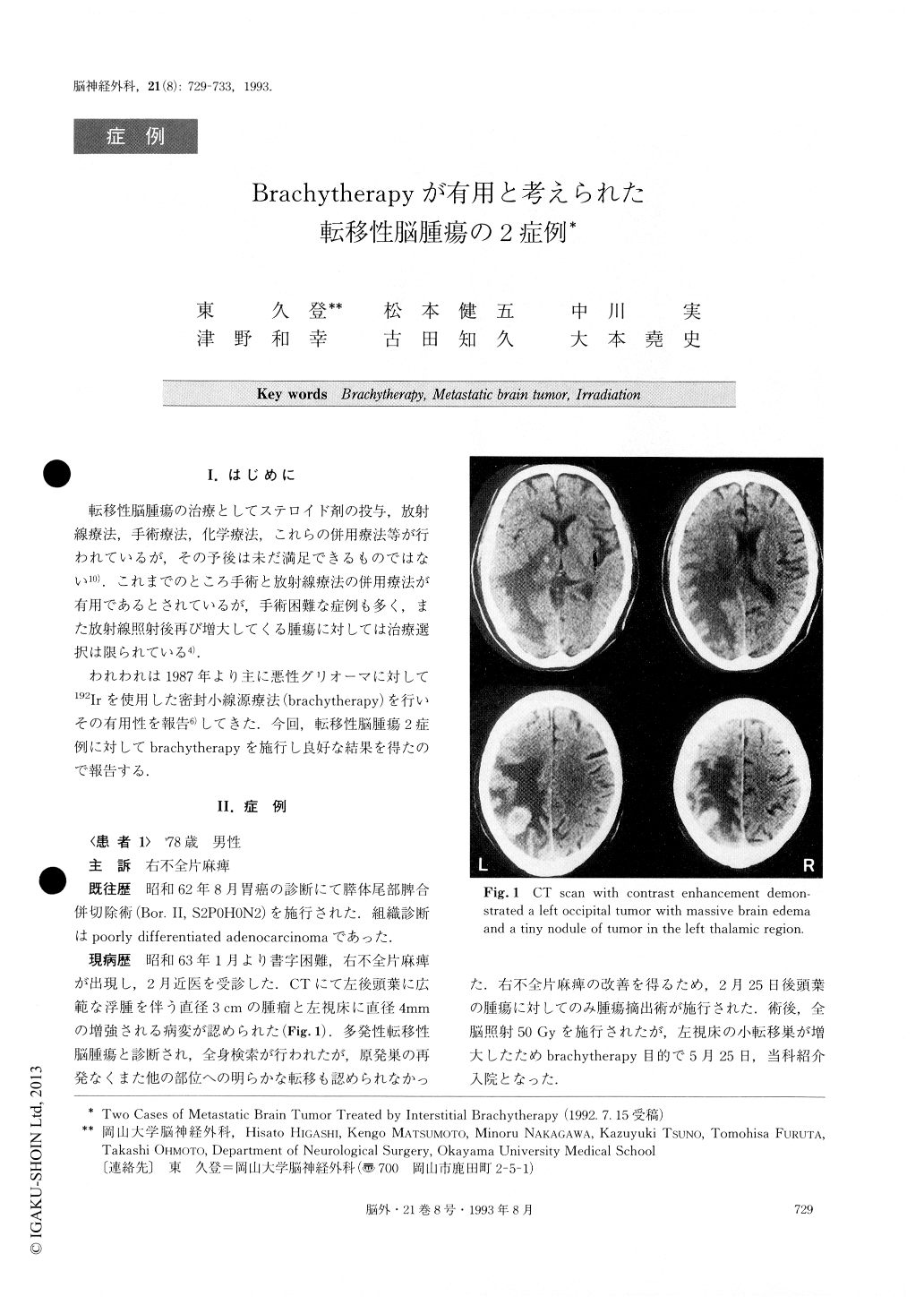Japanese
English
- 有料閲覧
- Abstract 文献概要
- 1ページ目 Look Inside
I.はじめに
転移性脳腫瘍の治療としてステロイド剤の投与,放射線療法,手術療法,化学療法,これらの併用療法等が行われているが,その予後は未だ満足できるものではない10).これまでのところ手術と放射線療法の併用療法が有用であるとされているが,手術困難な症例も多く,また放射線照射後再び増大してくる腫瘍に対しては治療選択は限られている4).
われわれは1987年より主に悪性グリオーマに対して192Irを使用した密封小線源療法(brachytherapy)を行いその有用性を報告6)してきた.今回,転移性脳腫瘍2症例に対してbrachytherapyを施行し良好な結果を得たので報告する.
The prognosis of patients with metastatic brain tumor is very poor. Median survival of these patients has ranged from 1 month with no therapy, to 2 months with steroid, and from 3 to 6 months with brain radiation ther-apy of the whole brain. A more recent study comparing radiation therapy alone with surgery plus radiation, has shown good results in the combined surgery and radia-tion therapy group. But surgical excision is usually li-mited to patients with a surgically accessible solitary metastasis. And therapeutic options are limited once the tumor recurs locally after whole brain irradiation.Inter-stitial irradiation allows the delivery of a high dose of localized irradiation in the area of tumor recurrence with minimal risk of radiation damage to the surrounding brain tissue. But brachytherapy for brain metastasis has been performed in few cases.
We reported two patients with unresectable metastatic brain tumors who were successfully treated with iridium-192 interstitial brachytherapy, and we discuss the strategy of the treatment.
Case 1 : A 78 year-old-man underwent a total gastrec-tomy for gastric cancer. Five months after surgery, he developed right hemiparesis. CT scan revealed a left occipital tumor with massive brain edema and a tiny nodule of tumor in the left thalamic region. The primary site was well-controlled and no systemic disease wasseen during subsequent whole body examination. The occipital lesion was surgically excised and he received a postoperative radiation therapy of 50 Gy to the whole brain. The thalamic tumor had not responded to the irra-diation and the size of tumor rapidly increased. He underwent the stereotactic Ir-192 interstitial brachyther-apy of 32 Gy at the tumor periphery using 1 catheter containing two seeds over 9 days. The CT scan obtained 6 months after the brachytherapy revealed a marked de-crease in the extent of contrast enhancement. He re-turned to social life and had a useful life for 8 months, but he died due to systemic disease 1 year after the brachytherapy.
Case 2: A 61 year-old-man with lung cancer had re-ceived radiation and chemotherapy. He noticed a right hemiparesis and sensory disturbance 15 months after the therapy for the primary lesion and was found, on CT scan, to have a left parietal lobe tumor. In view of theabsence of systemic disease and the location of the tumor, this patient was treated by stereotactic brachytherapy of 50 Gy at the tumor periphery using 4 catheters containing 24 seeds over 10 days. He received 40 Gy to whole brain and 10 Gy to the tumor in the left temporal lobe, which was found after brachytherapy by MRI. His symptoms gradually improved and he was dis-charged without any neurological deficits 2 months after brachytherapy. A CT scan taken 3 months after the brachytherapy showed decrease of tumor volume and peritumoral edema in spite of tapering off of corticoste-roid. The patient was doing well at the time of 8 months after the treatment.
No complications such as infection or hemorrhage were observed during and after the treatment in both patients. Brachytherapy seems to be useful for patients with inac-cessible metastatic brain tumor.

Copyright © 1993, Igaku-Shoin Ltd. All rights reserved.


